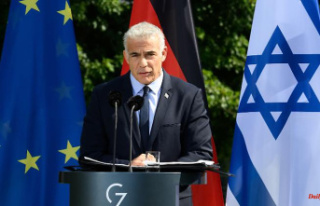With a package worth billions, the federal government wants to relieve citizens of rising prices. The NRW state government is increasingly asking itself: Who should pay for all this? And how do we also achieve our own black-green goals?
Düsseldorf (dpa/lnw) - Because of the consequential costs of the energy price crisis, North Rhine-Westphalia's Finance Minister Marcus Optendrenk fears cutbacks in the implementation of the coalition agreement. The addendum for the current financial year will only allow mandatory expenses to be shown, said the CDU politician on Monday in Düsseldorf. In view of the co-financing of the third relief package planned by the federal government and the expected subdued economy, "the room for maneuver to implement new things that we considered important is very small to zero".
The first black-green coalition in North Rhine-Westphalia, forged in June, has set itself the goal of investing over the next five years in making the state more socially just, ecological, digital and economically stronger.
After some strong criticism from the federal states, Chancellor Olaf Scholz (SPD) and the 16 prime ministers are to hold a summit on September 28 on the cost of the relief package. At the request of the German Press Agency, the spokesman for the federal government, Steffen Hebestreit, confirmed the date of the special prime ministers' conference. Some country heads of government had complained that they were supposed to cover part of the cost of the package but had not been asked beforehand.
A week ago, the traffic light coalition presented a third package of measures to compensate for the rapidly rising prices, the government estimates at around 65 billion euros. Criticism came from the Union-led states of North Rhine-Westphalia and Bavaria, as well as from Baden-Württemberg's green prime minister, Winfried Kretschmann.
The budget experts at the Düsseldorf Ministry of Finance see no basis for splitting the costs of the relief package 50:50 between the federal and state governments. After all, the business cycle and economic policy is a matter for the federal government, according to Optendrenk's authority. NRW wants to fight for a ratio of 75:25 or at most 70:30 in the upcoming talks and sees the main burden in any case with the federal government.
According to the Düsseldorf calculations, the relief package would otherwise result in over three billion euros in additional burdens in NRW alone in the coming year. Budget experts warn that if compliance with the debt brake is mandatory, this cannot be achieved without drastic savings.
Prime Minister Hendrik Wüst (CDU) has repeatedly emphasized that if the federal states should also pay, they would also have to be included in the decisions about the details of the package. The Düsseldorf Ministry of Finance insists that the desired aid must also be affordable.
The budgets of the federal states in particular are already heavily tied up due to high personnel costs - for example for teachers, police officers, judges and other civil servants - as well as the basic financing of the municipalities. In addition, the development of tax revenues is highly uncertain.
It is expected that Optendrenk will present the draft supplementary budget for the current year to the Düsseldorf cabinet on September 20th. Among other things, this is intended to cushion the costs of the Ukraine crisis in the municipalities. In addition, a proposal for an adjustment of the starting salary in the salary of teachers is to be presented. At the end of the month, the state parliament should then discuss the addendum to the budget law.
The SPD opposition in North Rhine-Westphalia called on the state government to no longer “hide” behind the federal government. The financial policy spokesman for the parliamentary group, Stefan Zimkeit, emphasized: "Now is the time for a strong welfare state". The state government must “use all of its own leeway, for example by abolishing daycare fees to support families with medium and low incomes in particular”.












